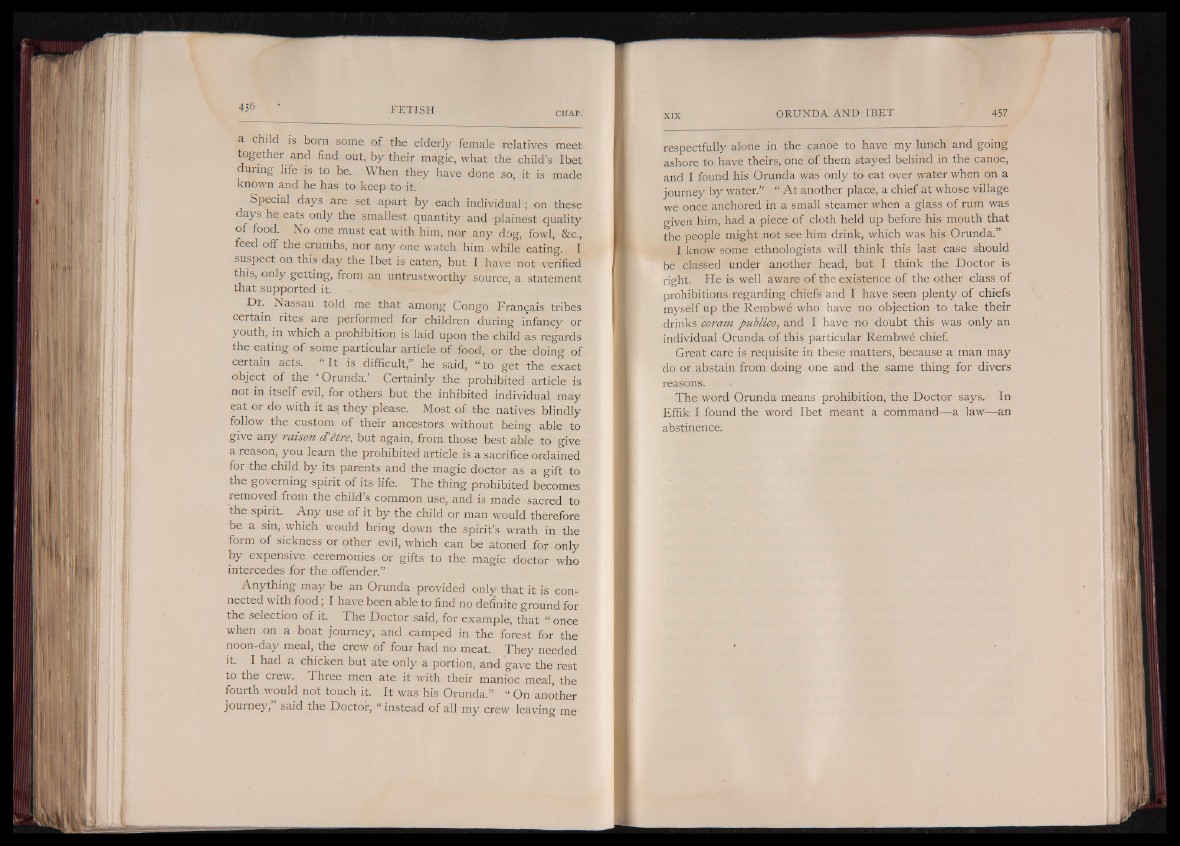
a child is born some of the elderly female relatives meet
together and find out, by their magic, what the child’s Ibet
during life is to be. When they have done so, it is made
known and he has to keep to it.
Special days are set apart by each individual ; on these
days he eats only the smallest quantity and plainest quality
of food. No one must eat with him, nor any dog, fowl, &c.,
feed off the crumbs, nor any one watch him while eating. I
suspect on this day the Ibet is eaten, but I have not verified
this, only getting, from an untrustworthy source, a statement
that supported it.
Dh Nassau told me that among Congo Français tribes
certain rites are performed for children during infancy or
youth, in which a prohibition is laid upon the child as regards
the eating of some particular article of food, or the doing of
certain acts. “ It is difficult,” he said, “ to get the exact
object of the ‘ Orunda.’ Certainly the prohibited article is
not in itself evil, for others but the inhibited individual may
eat or do with it as they please. Most of the natives blindly
follow the custom of their ancestors without being able to
give any raison d cirt\ but again, from those best able to give
a reason, you learn the prohibited article is a sacrifice ordained
for the child by its parents and the magic doctor as a gift to
the governing spirit of its life. The thing prohibited becomes
removed from the child’s common use, and is made sacred to
the spirit. Any use of it by the child or man would therefore
be a sin, which would bring down the spirit’s wrath in the
form of sickness or other evil, which can be atoned for only
by expensive ceremonies ,or gifts to the magic doctor who
intercedes for the offender.”
Anything may be an Orunda provided only that it is connected
with food ; I have been able to find no definite ground for
the selection of it. The Doctor said, for example, that “ once
when on a boat journey, and camped in the forest for the
noon-day meal, the crew of four had no meat. They needed
ii* Ï had a chicken but ate only a portion, and gave the rest
to the crew. Three men ate it with their manioc meal, the
fourth would not touch it. It was his Orunda.” 1 On another
journey, said the Doctor, “ instead of all my crew leaving me
respectfully alone in the canoe to have my lunch and going
ashore to have theirs, one of them stayed behind in the canoe,
and I found his Orunda was only to eat over water when on a
journey by water.” “ At another place, a chief at whose village
we once anchored in a small steamer when a glass of rum was
given him, had a piece of cloth held up before his mouth that
the people might not see him drink, which was his Orunda.”
I know some ethnologists will think this last case should
be classed under another head, but I think the Doctor is
right. He is well aware of the existence of the other class of
prohibitions regarding chiefs and I have seen plenty of chiefs
myself up the Rembwd who have no objection to take their
drinks coram publico, and I have no doubt this was only an
individual Orunda of this particular Rembw^ chief.
Great care is requisite in these matters, because a man may
do or abstain from doing one and the same thing for divers
reasons.
The word Orunda means prohibition, the Doctor says. In
Effik I found the word Ibet meant a command— a law— an
abstinence.